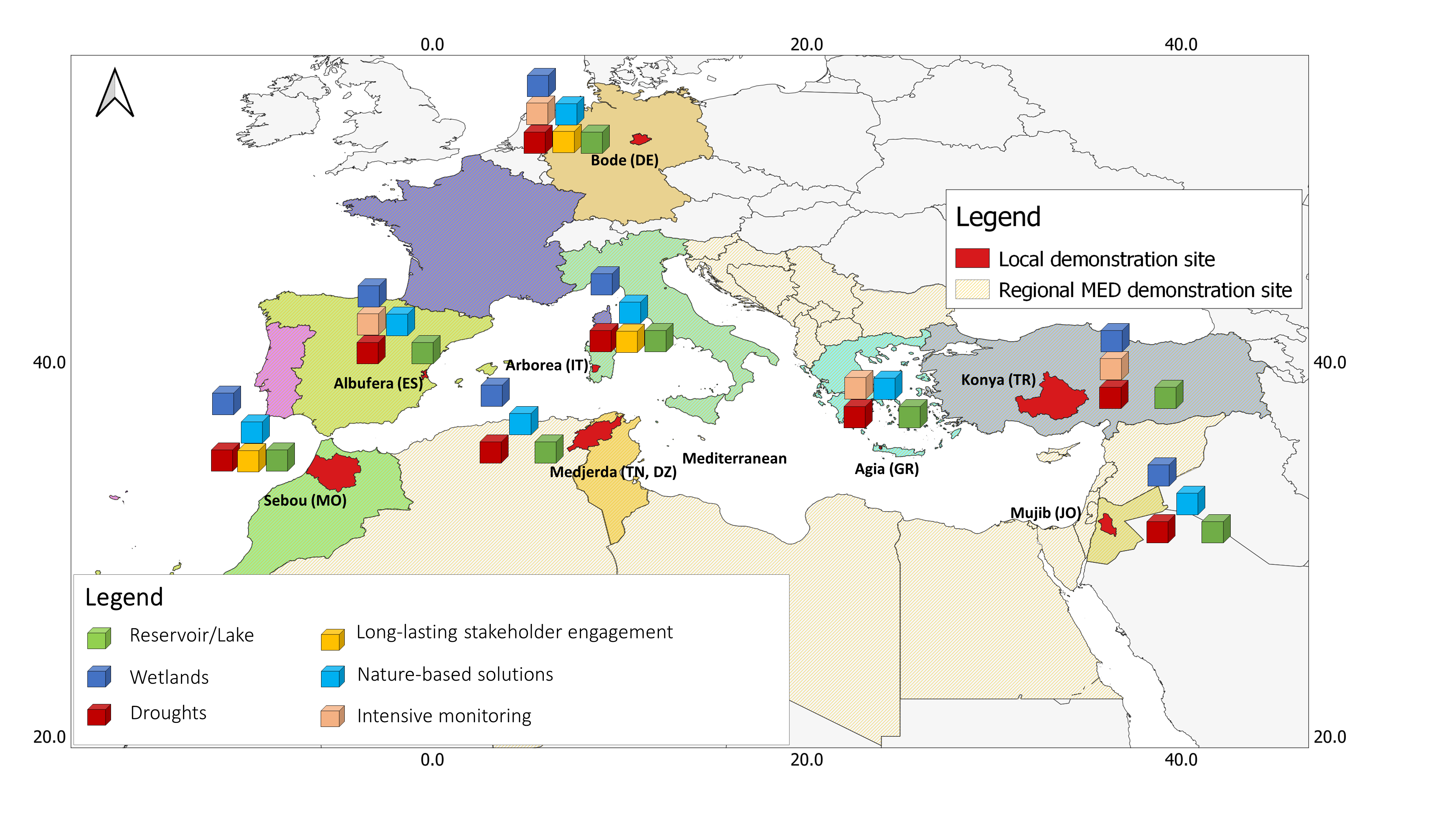
Sustainable water storage and distribution in the Mediterranean
The Mediterranean Region is unique in its human society, natural environment and biodiversity, and climate variability. However, it is experiencing rapid population growth, water scarcity, increasing anthropogenic pressures, and rapid climate change. This results in intensified water demand through increased irrigation and water consumption, severely threatening socio-economic stability and ecosystems integrity. In alignment with the challenge and scope of PRIMA call Topic 1.1.1, OurMED project was designed to emphasize the urgent need for more comprehensive management of water storage and distribution in the Mediterranean region than the existing plans, considering the natural resources and engineered infrastructure over the short and long-term horizons. OurMED is a new vision of fair, balanced and co-designed water storage and distribution management in the Mediterranean region including stakeholder perception and benefiting from technologically-advanced monitoring techniques, smart models prediction, and optimization, and digitalization capabilities. OurMED intends to develop integrated and holistic water management at various scale, ensuring multi-sectorial requirements and avoiding conflicts between domestic/industrial water use, food production, and ecosystem needs. OurMED also aims to reinforce short-term (winter/summer) water storage and distribution forecasting and long-term water management. To this end, a consortium of water experts with multidisciplinary but complementary skills intend to develop and implement tailored and sustainable nature-based water storage and distribution solutions in eight local and one regional demo sites, representative of typical water mismatch problems on both shores of the Mediterranean region. The demonstration sites were carefully selected, representing different climate conditions (arid to temperate climate), water and ecological challenges (water inefficiencies, soil erosion and sedimentation, water quality deterioration, and groundwater depletion), and different natural and artificial water bodies (lake, reservoirs, rivers, groundwater, and wetlands). OurMED aims to co-design and demonstrate water management pathways and solutions for each demonstration site by creating new long-lasting spaces for social learning among multi-sectorial and interdependent stakeholders, societal actors and scientific researchers. The efficiency and sustainability of stakeholders-suggested mitigation options under different socio-economic and climate projections will be assessed using environmental and socio-economical indicators. OurMED aims to reinforce scientific-based equitable water management in the Mediterranean region, especially under increasingly pressing future anthropogenic and climate conditions, learning from the impacts of historical extreme events experienced by the demonstration sites during the last decades. OurMED envisages moving from traditional single sector water management relying on a general threshold value and fixed-time horizon to more scientifically-based, multi-sectorial and case-specific “Precise Management”, recognizing the specificity of each demo site. To ensure upscaling and replicability of tailored solutions to other countries, the entire Mediterranean basin is considered as a separate demonstration site, with particular focus and investigation on essential water-ecosystem variables, systematic monitoring and data sharing, as well as policy examination towards multi-sectorial and sustainable water management and efficient governance at the regional scale. The long-term objective of the OurMED project is to establish guidelines and develop demonstrable test cases towards optimum and equitable water storage and distribution in the Mediterranean region.
PARTENERS
| Participant No* | PI name | Organisation | Country |
| 1 (Coordinator) | Dr. Seifeddine Jomaa | Helmholtz Centre for Environmental Research (UFZ) | Germany |
| 2 Partner 1 | Dr. Sandra Lohberger | Remote Sensing Solutions GmbH (RSS) | Germany |
| 3 Partner 2 | Prof. J. Jaime Gómez-Hernández | Universitat Politècnica de València (UPV) | Spain |
| 4 Partner 3 | Mr. Antonio Moya Diez | Idrica (IDRICA) | Spain |
| 5 Partner 4 | Mrs. Maroua Oueslati | Euro-Mediterranean Information System on know-how in the Water sector (SEMIDE) | France |
| 6 Partner 5 | Mr. Anis Guelmami | La Tour du Valat (TdV) | France |
| 7 Partner 6 | Prof. Georgios Karatzas | Technical University of Crete (TUC) | Greece |
| 8 Partner 7 | Prof. Maria Giovanna Tanda | Università di Parma (UNIPR) | Italy |
| 9 Partner 8 | Prof. Pier Paolo Roggero | University of Sassari (UNISS) | Italy |
| 10 Partner 9 | Prof. Salvatore Manfreda | University of Naples Federico II (UNINA) | Italy |
| 11 Partner 10 | Dr. Nashat Hamidan | Royal Society for the Conservation of Nature (RSCN) | Jordan |
| 12 Partner 11 | Mrs. Yousra Madani | Living Planet Morocco (LPM) | Morocco |
| 13 Partner 12 | Dr. Patrícia Lourenço | AgroInsider | Portugal |
| 14 Partner 13 | Prof. Slaheddine Khlifi | Higher School of Engineering of Medjez El Bab (ESIM) | Tunisia |
| 15 Partner 14 | Dr. Irem Daloglu Cetinkaya | Boğaziçi University (BU) | Turkey |